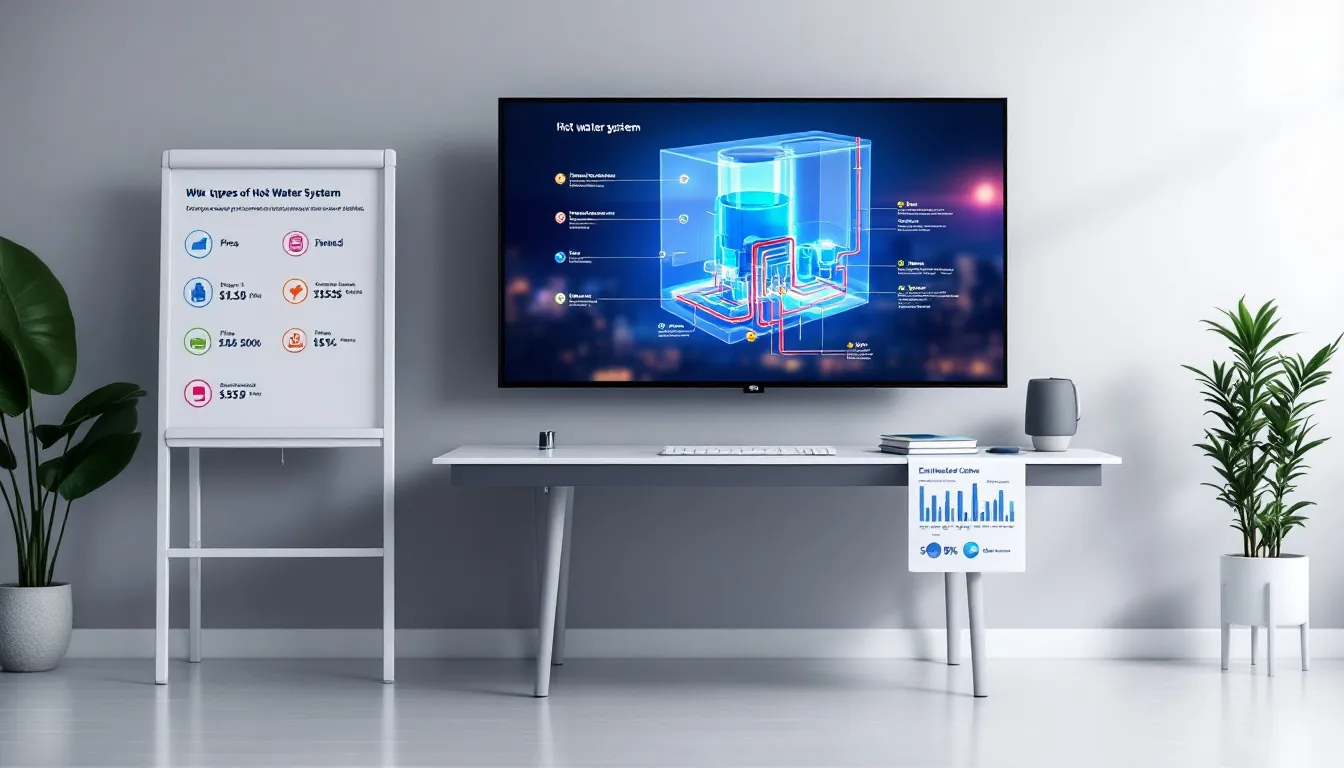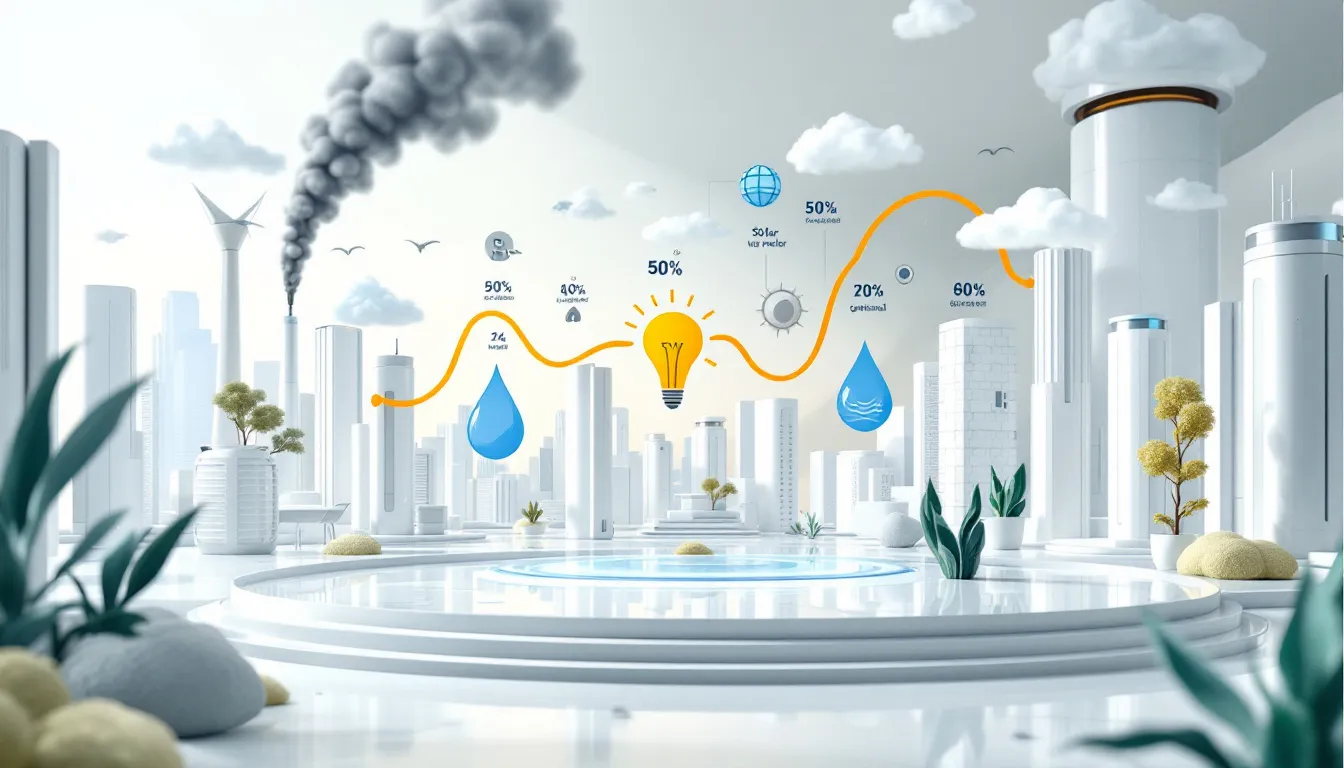Best Hot Water System Pricing - Costs & Installation Guide
Best Hot Water System Pricing - Costs & Installation Guide
Curious about hot water system pricing? This article breaks down the costs of electric, gas, solar, and heat pump systems. You’ll get insights into initial costs, installation fees, and ongoing expenses to help you choose the best option.
Key Takeaways
-
Different hot water systems, including electric, gas, solar, and heat pumps, each have distinct upfront costs and long-term savings potentials.
-
Installation costs vary widely by system type and complexity, typically ranging from $1,000 to $7,000, with additional factors affecting pricing.
-
Running costs and energy efficiency are critical factors to consider, as they influence overall savings; solar and heat pump systems offer lower long-term expenses compared to electric systems.
Types of Hot Water Systems and Their Costs

Knowing the different types of hot water systems helps in making an informed decision. The major types include electric, gas, solar, and heat pump systems, each with unique benefits and features. Costs for these systems vary significantly based on the type and features, with electric systems ranging from $400 to $1,700 and solar systems generally having the highest initial costs.
Evaluating both the initial costs and benefits of each type aids consumers in making informed choices.
Electric Hot Water System Costs
Electric hot water systems are a popular choice due to their reliability and relatively low upfront costs. The purchase price for these systems ranges from $450 to $1,800, depending on tank capacity. Installation costs typically add another $300 to $1,500. One significant advantage is the widespread availability of electricity, making these systems easy to install and maintain. The overall hot water system cost can vary based on these factors.
However, it’s essential to consider the long-term running costs, which can be higher due to electricity prices. Electric systems remain a favorable option for many households due to their initial affordability and ease of installation, despite the higher running costs.
Gas Hot Water System Costs
Gas hot water systems are a good middle-ground option. They balance installation costs with ongoing expenses effectively. The purchase cost for gas storage hot water systems ranges from $900 to $2,000. Installation costs can vary from $1,500 to $3,000, depending on the complexity and requirements of the installation.
Replacing an existing gas hot water system generally costs around $500 to $800. These systems primarily utilize natural gas or LPG, with natural gas being the more cost-effective and environmentally friendly option.
Solar Hot Water System Costs
Solar hot water systems are known for their higher upfront costs but offer significant long-term savings. The installation costs for these systems typically range from $3,000 to $7,000. While the initial investment is substantial, solar systems can cover up to 90% of a household’s hot water needs, leading to considerable financial benefits over time.
Replacing an existing solar hot water system might be more affordable, often involving just one or two panels and valves. This makes solar systems a sustainable and cost-effective option in the long run, despite the higher initial costs.
Heat Pump Hot Water System Costs
Heat pump hot water systems are among the most energy-efficient options available. The costs associated with these systems range from $2,500 to $4,000. Heat pumps are nearly three times more efficient than conventional electric systems, leading to significant energy savings.
Eco-conscious homeowners prefer these systems for their reduced greenhouse gas emissions and lower energy consumption. Although the initial costs are higher compared to electric systems, the long-term savings and environmental benefits make heat pumps an attractive choice for many households.
Installation Costs for Hot Water Systems

The installation costs for hot water systems can vary widely, influenced by factors such as the purchase price, installation fees, the type of system, and existing infrastructure. Local hot water professionals can provide accurate estimates for the desired system. Typically, installation costs can range from $1,000 to upwards of $7,000.
Accredited suppliers often provide direct discounts on installation costs for eligible hot water system upgrades.
Factors Influencing Installation Costs
Various factors can influence the installation costs of hot water systems. The type of system being installed plays a significant role; for instance, electric systems are often simpler and cheaper to install, typically requiring an existing 240-volt supply. In contrast, gas hot water system installation can incur additional costs, particularly if a larger gas connection is required.
Other factors include the complexity of the installation, the type of collector for solar systems, and local conditions. These elements can significantly affect the overall installation costs, so it’s important to consider all variables when planning a new installation.
Comparative Installation Costs
Installation costs can vary significantly between different types of hot water systems. Gas hot water system installations are generally more expensive than electric due to the additional requirements for gas lines. Solar hot water systems tend to have the highest installation costs due to their complexity and the need for specialized equipment.
Hiring licensed professionals is necessary for installation, and labor charges can vary widely. Therefore, obtaining multiple quotes and comparing overall costs ensures a cost-effective decision.
Running Costs and Energy Efficiency
Running costs and energy efficiency are critical considerations when choosing a hot water system. Hot water systems significantly contribute to household energy bills and carbon footprints. The costs involved in operating a hot water system include the cost of the system, installation, fuel or energy costs, and maintenance.
Choosing the right hot water system can improve energy efficiency and reduce costs.
Electric Hot Water System Running Costs
Electric hot water systems can incur annual energy costs ranging from $700 to $925. Typically, the energy consumption for water heating accounts for about a quarter of the entire household energy use. While electric storage hot water systems are generally inexpensive to purchase, they have high running costs compared to other models like gas or solar.
Using smart controls, timers, and water-saving habits can significantly reduce the running costs of electric hot water systems. Renewable energy integration can also reduce the carbon footprint and lower overall operating costs.
Gas Hot Water System Running Costs
Gas hot water systems generally have lower ongoing costs compared to electric systems due to cheaper natural gas prices. Lower usage rates make gas hot water systems more affordable in the long term. Additionally, gas hot water systems provide hot water even during power outages, enhancing their utility.
However, gas hot water systems emit carbon dioxide and can lead to methane leaks during natural gas extraction, contributing to greenhouse gas emissions. Despite these environmental drawbacks, lower running costs make gas systems a viable option for many households.
Solar Hot Water System Running Costs
The annual energy costs for solar hot water systems can range from $65 to $365. Solar hot water systems have lower long-term costs compared to electric or gas systems. While they feature higher initial costs, the operational expenses are significantly lower over time due to the utilization of solar power.
Investing in a solar hot water system can lead to substantial savings on energy bills and contribute to a reduction in greenhouse gas emissions. This makes solar systems attractive for eco-conscious homeowners seeking long-term savings.
Heat Pump Hot Water System Running Costs
Heat pump water heaters can be two to three times more energy-efficient than conventional electric systems. These systems utilize ambient heat and require less electricity, contributing to lower emissions and energy usage. Not too far behind in cost compared to solar (electric-boosted) systems, heat pump systems offer a cost-effective and environmentally friendly solution.
Lower running costs and high energy efficiency make heat pump systems an excellent choice for households aiming to reduce their environmental impact and save on energy bills.
Environmental Impact and Sustainability

Upgrading to eco-friendly hot water systems can significantly reduce a household’s carbon footprint. Solar hot water systems offer long-term savings and reduce greenhouse gas emissions.
The environmental impact of hot water systems varies significantly based on their energy sources.
Electric Hot Water Systems and the Environment
Electric models heat water using electricity sourced from renewable sources, making them better for the environment. Identifying eligible electric hot water systems is essential as it determines eligibility for rebates.
Although electric systems can have higher running costs, their potential to integrate with renewable energy sources like solar panels makes them an attractive option for environmentally conscious homeowners. This integration can significantly lower the carbon footprint, making electric systems a sustainable choice.
Gas Hot Water Systems and Emissions
Gas hot water systems are less environmentally friendly compared to other hot water systems. They run on fossil fuels, which contributes to their environmental impact. While gas systems generate fewer emissions compared to other systems, they still contribute to overall greenhouse gas emissions.
The reliance on fossil fuels and the associated greenhouse gas emissions highlight the environmental drawbacks of gas hot water systems. This makes them a less favorable option for those looking to minimize their environmental footprint.
Solar and Heat Pump Systems for Sustainability
Solar hot water systems utilize sunlight to produce energy, greatly reducing greenhouse gas emissions. These systems offer substantial long-term savings and are highly energy-efficient, making them a top choice for sustainability-conscious households. Additionally, solar systems can integrate seamlessly with existing solar panels, further enhancing their sustainability.
Heat pump systems are also gaining recognition for their energy-efficient performance and cost-effectiveness. By capturing heat from the environment, heat pump systems use less energy and emit fewer pollutants. This makes them an excellent option for households looking to reduce their carbon footprint while enjoying the benefits of a reliable hot water system.
Choosing the Right Hot Water System for Your Home

Choosing the right hot water system for your home involves assessing your household’s hot water usage and comparing both upfront and ongoing costs. Energy consumption estimates for hot water systems depend on household size and daily use.
Evaluating both the initial purchase and long-term operational costs is essential for making an informed decision.
Assessing Household Hot Water Usage
Household water consumption plays a major role in determining the most suitable hot water system for installation. As the number of occupants increases, hot water demand also rises. Usage patterns, like peak morning use, can affect the overall hot water requirements. The tank size selected can directly impact both upfront costs and long-term efficiency.
For continuous flow systems, size the system according to the number of hot water outlets rather than household size. Climatic conditions in your region can also influence the size and type of hot water heater needed. Low-flow fixtures can significantly reduce hot water consumption, making them a valuable addition to any household.
Comparing Upfront and Ongoing Costs
Balancing upfront investment and ongoing costs is crucial for selecting the appropriate hot water system. The estimated annual energy costs for a solar power system range from $65 to $365, making them a cost-effective option in the long term. Factors such as climate, system size, and the household’s hot water usage significantly influence the cost-effectiveness of solar hot water systems.
Considering both upfront costs and long-term savings is key to making an informed decision. For instance, while electric systems may have lower initial costs, their higher running costs can make them more expensive over time. Conversely, solar and heat pump systems may have higher upfront costs but offer significant savings through reduced energy bills.
Maintenance and Longevity of Hot Water Systems
Regular maintenance is vital to ensure hot water systems operate efficiently and safely, thus extending their lifespan. Neglecting maintenance can lead to higher repair costs and inefficiencies.
Consistent maintenance ensures efficient and safe operation of hot water systems, ultimately prolonging their lifespan.
Regular Servicing Schedules
Different types of hot water systems have unique servicing needs and schedules. The manufacturer’s guidelines often dictate the recommended servicing frequency. For example, electric hot water systems typically require servicing every two to three years to maintain optimal performance. Regular servicing is essential to ensure the system operates efficiently and has a long lifespan.
Adhering to these schedules prevents potential issues and ensures hot water systems run at peak efficiency. This extends the system’s life, helps maintain lower energy bills, and reduces the risk of unexpected breakdowns.
DIY Maintenance Tips
Simple DIY maintenance tasks can help keep your hot water system efficient. Insulating hot water pipes can reduce heat loss and wasted energy, especially for long pipe runs.
Regularly checking and replacing the anode rod in storage tank systems can prevent corrosion and extend the tank’s lifespan. Additionally, periodically flushing the tank can remove sediment buildup, improving efficiency and performance.
Government Incentives and Rebates
Government incentives and rebates can significantly reduce the cost of installing energy-efficient hot water systems. Financial incentives are available for electric hot water systems. Users of certified solar systems can benefit financially through STC rebates.
Manufacturers can also assist with costs by offering special financing programs for electric hot water systems.
Eligibility for Rebates
Eligibility requirements for financial incentives differ by state, so check specific criteria before purchasing a new water heater. In some states, suppliers can assist with the application process for rebates and incentives, simplifying the paperwork. Identifying accredited suppliers is essential as they set the discount amounts for upgrading to energy-efficient systems.
Understanding eligibility criteria for government rebates and incentives is essential for maximizing savings on hot water systems. By working with accredited suppliers and meeting state-specific requirements, homeowners can lower the overall cost of their hot water system installation.
Applying for Incentives
To apply for incentives, homeowners must work with accredited suppliers authorized to offer these discounts. These suppliers can guide you through the application process, ensuring all necessary documentation is completed correctly.
Taking advantage of these incentives can significantly reduce the upfront costs of installing a new, energy-efficient hot water system.
Summary
Choosing the best hot water system involves considering various factors such as initial costs, installation expenses, running costs, energy efficiency, and environmental impact. Electric, gas, solar, and heat pump systems each have their unique advantages and disadvantages. By assessing your household’s hot water usage and comparing the upfront and ongoing costs, you can make an informed decision that suits your needs and budget. Remember, regular maintenance is key to ensuring the longevity and efficiency of your hot water system. Take advantage of government incentives and rebates to reduce your costs and contribute to a more sustainable future.
Frequently Asked Questions
What are the main types of hot water systems available?
The main types of hot water systems available are electric, gas, solar, and heat pump systems, each offering distinct advantages tailored to different needs. Selecting the right system depends on your specific requirements and energy preferences.
How much does it cost to install an electric hot water system?
Installing an electric hot water system typically costs between $750 and $3,300, including the purchase price and installation fees. It's important to consider both costs when budgeting for your new system.
What are the running costs of a gas hot water system?
Gas hot water systems typically incur lower running costs than electric systems due to reduced usage rates and generally lower prices for natural gas. This makes them a cost-effective choice for heating water.
How do solar hot water systems benefit the environment?
Solar hot water systems significantly benefit the environment by harnessing sunlight for energy, which lowers greenhouse gas emissions and promotes sustainability. This transition to renewable energy leads to long-term ecological advantages.
Are there any government incentives for installing energy-efficient hot water systems?
Yes, there are government incentives and rebates available for installing energy-efficient hot water systems, including electric and solar options. It's beneficial to research local programs that can help offset installation costs.




























